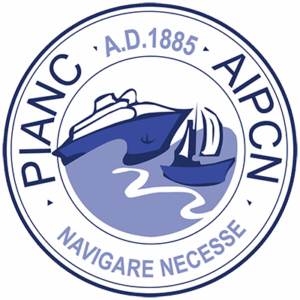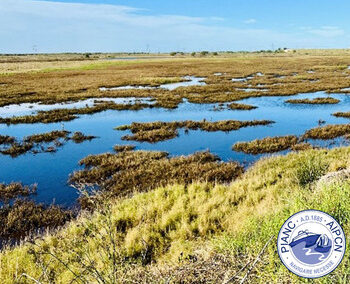PIANC’s Environmental Commission has established a new Working Group on Blue Carbon. Apply now to be part of the future!
WG256: UNDERSTANDING BLUE CARBON; A PRACTICAL GUIDE
Close of applications Wed 17 July 2024!
About the Working Group:
A main objective of this Working Group report will be to define the concept including describing why and how blue carbon is relevant to waterborne navigation infrastructure. The report will present a broad ‘state of knowledge’ overview of blue carbon in the context of navigation and associated infrastructure, operations, and activities internationally.
In particular, the Working Group will explore the following navigational infrastructure elements and their relationship to and impacts on blue carbon:
- Ports and navigation infrastructure and operations, including recreational infrastructure
and operations, supported by MarCom and RecCom contributions - Coastal, estuarine, and riverine flood protection measures
- Sediment dredging, disposal, and beneficial use opportunities
- Habitat restoration and enhancement and ecosystem service approaches in the context
of mitigation, compensation, or biodiversity offsetting for new development - Achieving net zero emissions of greenhouse gases from existing activities and operations
or from new development projects - Climate change adaptation, strengthening the resilience of both navigation and nature
- Applying working with nature (WwN) and nature-based solutions (NbS) in operating or
managing waterborne navigation infrastructure - Creation of and support for local livelihood activities within blue carbon habitats
Whilst blue carbon often refers to marine ecosystems, the Working Group will explore the relevance of blue carbon to freshwater habitats and, thus, to the management of inland waterways and infrastructure, supported by InCom contributors.
For more information, please download full Terms of Reference here.
Interested in being part of this International Working Group?
If you would like to represent the Australian & New Zealand National Section of PIANC on this Environmental Commission Working Group please apply to the AU-NZ Board.
Many of our members are currently active on a number of PIANC Working Groups and they produce significant outcomes that benefit maritime matters in our region. They also bring significant benefits to participants who get to meet, learn from and share with global experts.
Please advise if you qualify as a Young Professional (40 years or younger) as there are two positions available in each Working Group, one of which is for a YP.
How to Apply
Please forward your application before COB Wed 17 July 2024 to PIANC AU-NZ Technical Commission Lead Adam van der Beeke (EnviCom Lead for PIANC AU-NZ) E: Adam.vanderBeeke@fremantleports.com.au
You must also cc PIANC AU-NZ EO Paul Weston, E: Paul.weston@pianc.org.au and Greg Britton, Technical Commission Lead AU-NZ. E: greg.britton@rhdhv.com
Process for Applications
Your application should include a detailed CV/Resume with a short covering letter outlining:
1. Your experience in the particular technical field; see expertise list above.
2. Why the WG is relevant for the Australian / NZ content and the direct benefits of participation;
3. A commitment that you will prepare (for distribution to all members) a short report providing an overview & outcomes of the WG etc;
4. Whether or not you are seeking to access Travel Assistance Policy (TAP )funding; and
5. Whether you qualify as a Young Professional.
Eligibility:
Please note that Working Group Members need to be Individual Members of PIANC, working for a Corporate Member or Platinum Partner, be an invited expert or a be a member of a Sister Organisation.
Process:
A Selection Committee will review all nominations received and make a final recommendation to the PIANC AU-NZ Chair.
Responsibilities:
Please be aware that membership of a Working Group does require your active participation. This includes attending Working Group meetings (pre-Covid -19 this was usually at international locations) or as a ‘Corresponding Member’ if you do not want to undertake the normal travel requirements of full membership. If you are expert in the field and would like to influence the outcome of the Working Group we encourage you to participate as fully as you are able.
Costs:
All costs associated with membership must be borne by either yourself or your employer, however PIANC Australia & New Zealand has a Travel Assistance Policy to partially assist with travel & attendance at Working Group meetings, in order to promote Australian and New Zealand technical input into these important WG activities.
Under the PIANC AU-NZ Travel Assistance Policy (TAP), up to $2,000 funds may be payable post travel upon the successful completion of a WG Summary Report and production of relevant travel receipts.

